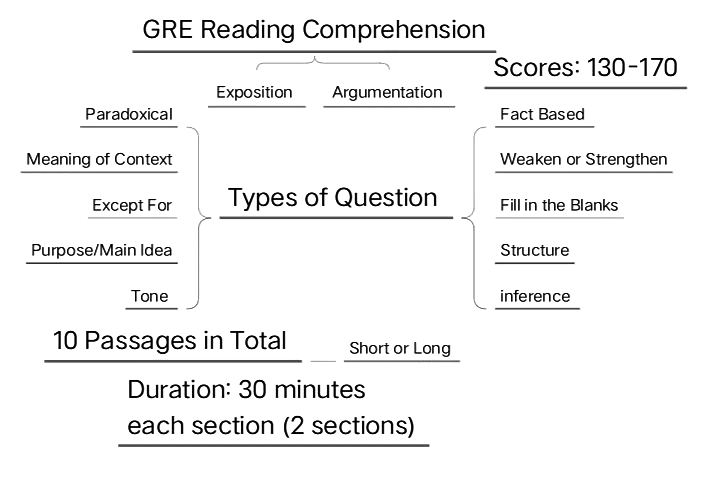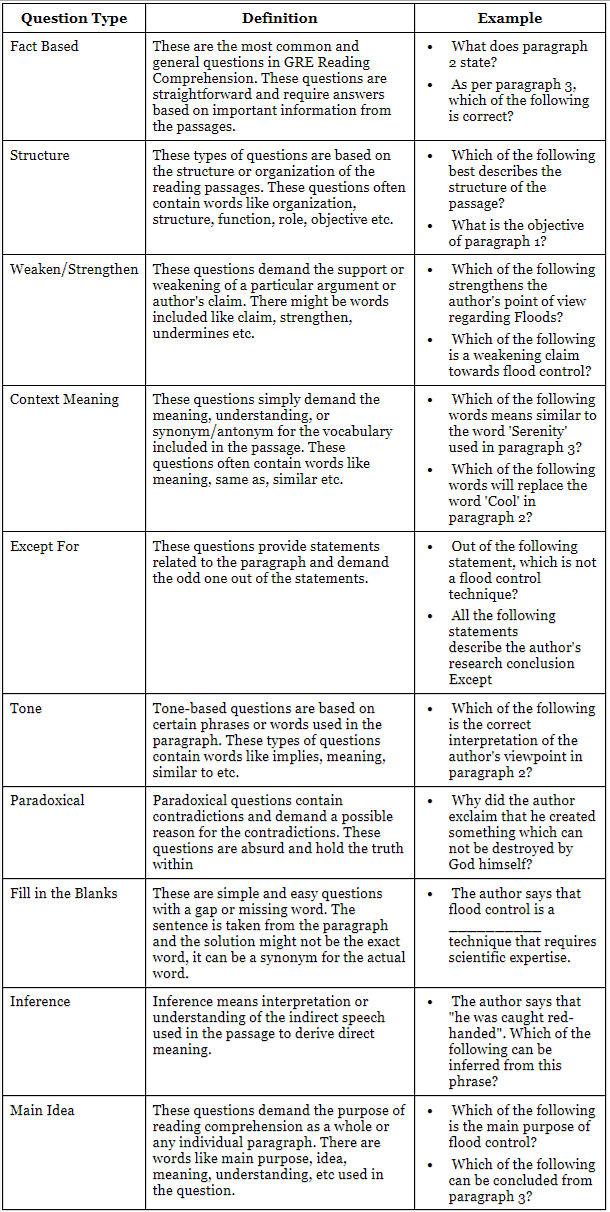GRE Reading Comprehension Question Types | Verbal Reasoning for GRE PDF Download
| Table of contents |

|
| GRE Reading Comprehension Exam Pattern |

|
| GRE Reading Comprehension Paragraph Types |

|
| GRE Reading Comprehension Question Types |

|
| GRE Reading Comprehension Tips |

|
GRE Reading Comprehension Exam Pattern
In the GRE Verbal section, there are around 10 passages, each accompanied by individual questions. The time allocation for each section of GRE Verbal is 30 minutes, and the overall time duration for the entire GRE exam is 3 hours and 45 minutes. The following chart outlines the exam pattern for GRE reading comprehensions:

GRE Reading Comprehension Paragraph Types
Two distinct types of reading paragraphs exist: Exposition and argumentative. These paragraphs can be either brief, spanning 50-100 words, or lengthy, ranging from 350-400 words. Each paragraph type encompasses unique information and structure. Additionally, each passage is accompanied by 1-5 questions. Following is the description of the GRE Paragraph type:
Exposition Paragraph
- An exposition paragraph provides a description centered around an idea or scientific theory.
- It commences with a background before presenting a claim.
- The passage exhibits a cause-and-effect relationship, incorporating the author's perspective.
- The length of an exposition passage can vary, ranging from short to long.
- 1-5 questions accompany the passage.
Argumentative Paragraph
- An argumentative paragraph revolves around an issue or argument, presenting both positive and negative aspects.
- The argumentative paragraph may or may not conclude with a resolution.
- It begins with a background, introducing the issue, positive and negative points, and the author's viewpoints.
- Similar to exposition, argumentative passages may vary in length.
- 1-5 questions are associated with the passage.
GRE Reading Comprehension Question Types
There are a total of 10 different types of questions asked in the GRE Reading comprehension section. The questions are based on the information provided in the paragraphs. Students do not require any extra outside information to answer the questions. The questions are multiple-choice questions. The following table provide different types of question and examples in GRE Reading Comprehension:

GRE Reading Comprehension Tips
Achieving a high score on the GRE is crucial for gaining admission to top-tier universities, and the GRE Verbal section plays a significant role in this. To attain a competitive score, students can employ specific tips and strategies that facilitate effective problem-solving during the exam. Following are a few tips for GRE Reading Comprehension:
- Read the questions and locate the answers to avoid time wastage.
- Understand the author's perspective and use of speech.
- Avoid memorizing and try remembering the location of the text.
- Improve vocabulary by learning new words every day.
- Take help from preparation books and online courses.
- Practice as much as possible by solving online available mock tests and practice tests.
- Read articles and essays and derive conclusions from them.
- Read novels and write down the meaning of unknown words.
|
44 videos|41 docs|83 tests
|




















